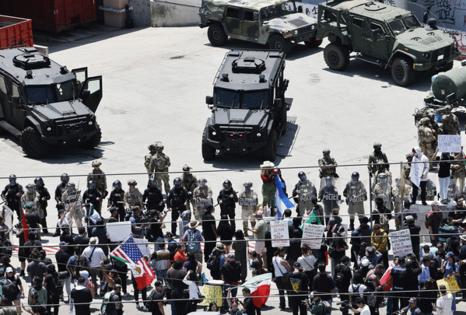California Gov. Newsom's legal fight against Trump continues over Guard troops in LA
Published in News & Features
SACRAMENTO, Calif. — Lawyers for California Gov. Gavin Newsom continued their court battle on Monday against President Donald Trump’s deployment of the National Guard and other military personnel to Los Angeles during protests over immigration raids.
The case is the latest flash point between the Democratic governor and the Republican president, and court briefs filed by both sides in San Francisco federal court on Monday come days after a panel of the 9th U.S. Circuit Court of Appeals ruled in Trump’s favor, saying he “likely” did have the right to activate the guard and take over its control despite Newsom’s opposition.
The guard has been in Los Angeles since June 8, after large crowds gathered to protest immigration raids targeting day laborers seeking work at Home Depot stores and undocumented employees in the city’s garment district. Newsom filed a lawsuit two days later, alleging that Trump had broken the law by activating the Guard without his consent and in violation of laws limiting the use of military personnel in domestic situations.
Senior U.S. District Judge Charles R. Breyer issued a temporary restraining order against the deployment and ordered Trump to return control of the guard to Newsom. But the three-judge appellate panel stopped the order from going into effect, citing laws allowing the president to use the guard in situations where federal law could not otherwise be enforced.
Elements of Trump’s appeal of the temporary restraining order are still before the appellate court, and have yet to play out.
But Breyer also still has a role to play, because the original lawsuit was filed in his court. However, it is unclear which issues he will take on as the appellate process continues.
“What we’ll see Breyer, the judge, do is make a decision about whether to proceed,” said Leslie Gielow Jacobs, a professor of constitutional law at the University of the Pacific’s McGeorge School of Law in Oak Park. “California is saying there are still some issues you didn’t decide and you should proceed with them.”
On Monday, Newsom’s attorneys argued that Breyer, who had appeared sympathetic to the state’s arguments, could still rule on questions that the appeals court was not considering, including ordering Trump to remove the Guard after a specific period.
The governor also argued that Breyer could consider whether Trump violated a law called the Posse Comitatus Act, which limits the use of the guard or other military forces in domestic situations. He asked for two weeks to gather information on the role that the Guard and the Marines were playing in Los Angeles, to see if the administration had limited the troops’ roles to protecting federal property and personnel, as the law requires.
It would take the invocation of yet another law, the Insurrection Act, to allow full military deployment to a domestic situation.
In his brief on Trump’s behalf, Assistant U.S. Attorney General Brett Shumate argued that Breyer did not have the jurisdiction to rule on those questions, because the issues remained before the 9th Circuit, which has yet to rule on the merits of the district judge’s initial temporary restraining order or the reasoning behind it.
Just as Trump has discretion over whether to deploy the guard, he also has discretion over how long troops should remain, Shumate and the other federal lawyers working on the case argued.
Moreover, they said, even if Breyer could rule on Newsom’s request for a limit to the guard’s deployment, there was no need to do so, because it was already scheduled to run out after 60 days.
The case is unusual, said Gielow Jacobs, because of the speed at which it is playing out, leading to court proceedings taking place in more than one jurisdiction in ways that are not entirely typical. The appeals court will still hold a hearing on the merits of the arguments underpinning the temporary restraining order, at a future unspecified date. A panel that could contain a different set of judges would then either strike it down permanently or let it stand.
Theoretically, Breyer would not have jurisdiction over those arguments until the appeals panel is finished. If the panel strikes down the state’s arguments forcefully and for a second time, Breyer could still theoretically hold a full trial on the question but, at that point, the state might decide not to pursue it, Gielow Jacobs said.
Breyer is expected to decide how he plans to proceed with the case in the coming days.
______
©2025 The Sacramento Bee. Visit sacbee.com. Distributed by Tribune Content Agency, LLC.







Comments